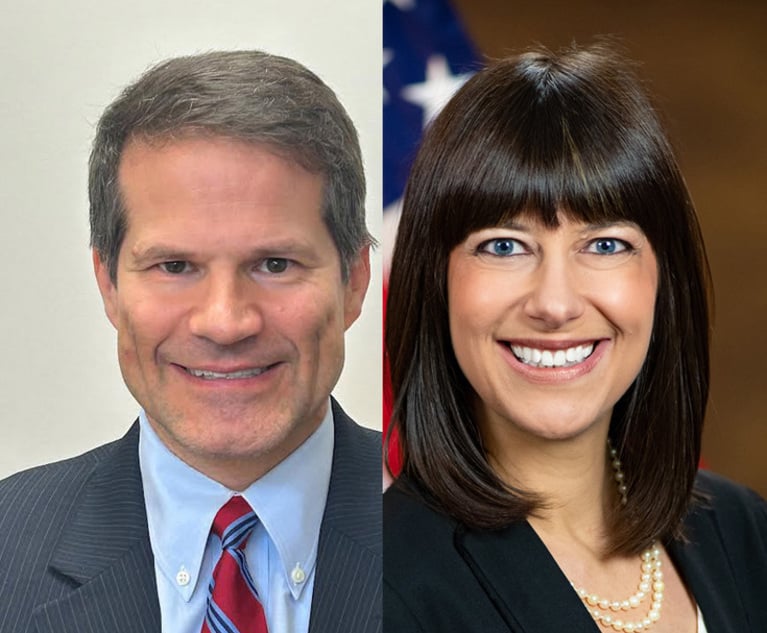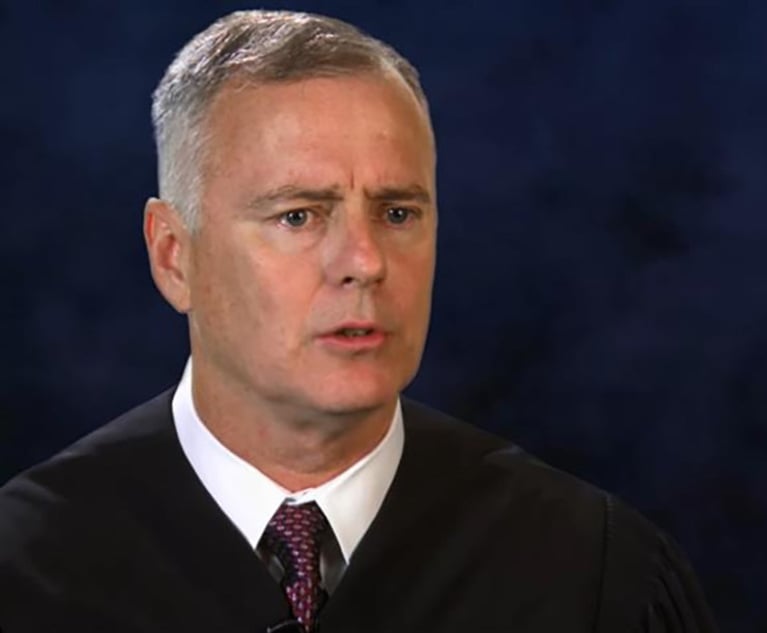The SEC's Whistleblower Program in 'Full Stride': By the Numbers
Here's a deeper look, by the numbers, into the SEC whistleblower program's past and the awards that could be coming.
November 21, 2017 at 12:15 PM
7 minute read
 Jane Norberg, the SEC's whistleblower chief. Credit: Diego M. Radzinschi
Jane Norberg, the SEC's whistleblower chief. Credit: Diego M. Radzinschi
A year after pushing total bounties past the $100 million mark, the U.S. Securities and Exchange Commission's whistleblower program forged ahead in the fiscal year ending Sept. 30 with nearly $50 million in awards to 12 tipsters, bringing the total number of recipients to 46.
Among those whistleblowers, according to the agency's annual report to Congress, was a company insider who received $5.5 million for setting off an investigation that would shut down a scheme that targeted what the SEC described as a “vulnerable investor community.” Another whistleblower received more than $20 million—the third highest award in the program's nearly seven-year history—for helping regulators bring an enforcement action against wrongdoers before they could squander their ill-gotten gains.
But the SEC's efforts for whistleblowers went beyond bounties.
The SEC sought to protect tipsters and preserve clear lines of communication with regulators with a $500,000 fine of the financial services company HomeStreet in the latest settlement over severance agreements that require employees to waive their rights to whistleblower awards. And in the courts, the SEC defended its view that the Dodd-Frank Act's anti-retaliation protections extend not only to whistleblowers who come “to the commission,” as the statute states, but also those who only flag issues internally. With the U.S. Supreme Court set to review the scope of whistleblower protections, U.S. Solicitor General Noel Francisco filed an amicus brief last month supporting the SEC's interpretation.
“Put simply, if individuals are not assured they will be protected from retaliation if they report internally, they will be less likely to report internally, which could undermine the important role that internal compliance programs play in helping the commission prevent, detect, and stop securities law violations,” the SEC whistleblower office said in its annual report.
Here's a deeper look, by the numbers, into the SEC whistleblower program's past and the awards that could be coming.
$671 million
Former SEC Chairwoman Mary Jo White, now the senior chair of Debevoise & Plimpton, once described the whistleblower program as a “game changer.” Indeed, whistleblower information has helped the commission's enforcers order wrongdoers to pay nearly $1 billion in monetary sanctions. But supporters of the SEC's whistleblower office often prefer to highlight a lower—albeit still large—figure: Of the $975 million in sanctions, about $671 million came in the form of disgorgement of ill-gotten gains.
“That's an eye-opening figure,” said Sean McKessy, the first chief of the SEC program, who is now a partner at the whistleblower firm Phillips & Cohen. “That's real money that's back in people's pockets because of the whistleblower program.”
$221 million
Every year, the SEC whistleblower office's report to Congress provides a comprehensive review of the recent awards and notable steps to protect tipsters. It was another document, the agency's annual financial report, that provided a telling figure about the program's future.
In that report, the SEC estimated that $221 million in future whistleblower payments are “probable.” The agency gave no timetable for doling out that estimated amount, which it identified as a “contingent liability.” At the same time last year, the SEC identified a contingent liability of $10.8 million for future whistleblower awards.
Choate partner Greg Keating, chairman of the firm's whistleblower defense practice group, said the estimate shows the SEC program has hit “full stride.”
“The fact that they have, to date, issued [about $160 million] since the program began—$50 million in the last year alone—and set aside $221 million for whistleblower awards that are probable to be doled out is suggestive of an agency that is in full stride and a funnel that is full,” he said. “Investigations are now rounding the bend. We're likely to hear more and more from the SEC in coming months.”
4,400
Between October 2016 and September 2017, the SEC received more than 4,400 tips—a 50 percent increase from the 3,000 tips received in the fiscal year that ended September 2012. The tips have streamed in not just from across the United States—namely California, New York, Texas, Florida and New Jersey—but also from 114 countries. In recent years, tips arrived from 72 countries, with the highest number coming from the United Kingdom, Canada and Australia.
SInce August 2011, the SEC has received more than 22,000 whistleblower tips.
Whistleblower firms are increasingly viewing the United Kingdom as fertile ground for tips that could reap rewards in the United States, either under SEC's program or the False Claims Act.
However, with the United Kingdom set to depart from the European Union, some firms are re-evaluating. “There's some suggestion that companies are relocating and Brexit is going to cause some displacement,” McKessy said. “We want to focus on, if London is going to be its own entity, what other countries might assume the mantle as Europe's financial center and focus our efforts on finding other countries that might assume the mantle.”
62
Of the 46 whistleblowers who've received awards thus far, 62 percent were current or former insiders of the company they reported to the SEC. And of those insiders, 83 percent reported internally before contacting the federal regulator—a statistic the program's supporters have held out to rebut the notion that the SEC's whistleblower program undercuts companies' compliance systems.
“So that's a pretty good stat as far as internal reporting goes,” said Jane Norberg, chief of the SEC whistleblower program, at the SEC Enforcement Forum in Washington last month.
1
After seeing federal appeals court split over its broad view of anti-retaliation protections, the SEC whistleblower office will be closely watching one Supreme Court case this term. The high court is reviewing the Ninth Circuit's decision in Digital Realty Trust v. Somers, in which a divided panel of the appeals court backed the SEC's position that corporate insiders need not bring tips “to the commission” in order to receive whistleblower protections.
Norberg has questioned the wisdom of the industry challenges. If the industry side wins, she said, whistleblowers will be more incentivized to come to the agency rather than go through the internal process.
“The ironic part of all of this is that some of the same companies that commented during the rulemaking process about requiring internal reporting or incentivizing internal reporting are some of the very same companies who are in court now challenging an employee's right to bring a whistleblower retaliation lawsuit for reporting the information internally,” Norberg said in June. “So, in my view, this is a little bit of a thorny issue and a case of 'be careful of what you wish for.'”
Read more:
This content has been archived. It is available through our partners, LexisNexis® and Bloomberg Law.
To view this content, please continue to their sites.
Not a Lexis Subscriber?
Subscribe Now
Not a Bloomberg Law Subscriber?
Subscribe Now
NOT FOR REPRINT
© 2024 ALM Global, LLC, All Rights Reserved. Request academic re-use from www.copyright.com. All other uses, submit a request to [email protected]. For more information visit Asset & Logo Licensing.
You Might Like
View All

Trump's Solicitor General Expected to 'Flip' Prelogar's Positions at Supreme Court

Auditor Finds 'Significant Deficiency' in FTC Accounting to Tune of $7M
4 minute read
Texas Court Invalidates SEC’s Dealer Rule, Siding with Crypto Advocates
3 minute readTrending Stories
- 1SEC Targets Rising Crypto Financier in $115 Million Securities Fraud
- 2Musk Avoids Sanctions for Skipping SEC Testimony for Rocket Launch
- 3On Advice of DOJ Office, Special Counsel Moves to End Trump Prosecution
- 4Stars and Gripes: Merging Firms Need a ‘Superstar Culture’ for US Success
- 5Elaine Darr Brings Transformation and Value to DHL's Business
Who Got The Work
Michael G. Bongiorno, Andrew Scott Dulberg and Elizabeth E. Driscoll from Wilmer Cutler Pickering Hale and Dorr have stepped in to represent Symbotic Inc., an A.I.-enabled technology platform that focuses on increasing supply chain efficiency, and other defendants in a pending shareholder derivative lawsuit. The case, filed Oct. 2 in Massachusetts District Court by the Brown Law Firm on behalf of Stephen Austen, accuses certain officers and directors of misleading investors in regard to Symbotic's potential for margin growth by failing to disclose that the company was not equipped to timely deploy its systems or manage expenses through project delays. The case, assigned to U.S. District Judge Nathaniel M. Gorton, is 1:24-cv-12522, Austen v. Cohen et al.
Who Got The Work
Edmund Polubinski and Marie Killmond of Davis Polk & Wardwell have entered appearances for data platform software development company MongoDB and other defendants in a pending shareholder derivative lawsuit. The action, filed Oct. 7 in New York Southern District Court by the Brown Law Firm, accuses the company's directors and/or officers of falsely expressing confidence in the company’s restructuring of its sales incentive plan and downplaying the severity of decreases in its upfront commitments. The case is 1:24-cv-07594, Roy v. Ittycheria et al.
Who Got The Work
Amy O. Bruchs and Kurt F. Ellison of Michael Best & Friedrich have entered appearances for Epic Systems Corp. in a pending employment discrimination lawsuit. The suit was filed Sept. 7 in Wisconsin Western District Court by Levine Eisberner LLC and Siri & Glimstad on behalf of a project manager who claims that he was wrongfully terminated after applying for a religious exemption to the defendant's COVID-19 vaccine mandate. The case, assigned to U.S. Magistrate Judge Anita Marie Boor, is 3:24-cv-00630, Secker, Nathan v. Epic Systems Corporation.
Who Got The Work
David X. Sullivan, Thomas J. Finn and Gregory A. Hall from McCarter & English have entered appearances for Sunrun Installation Services in a pending civil rights lawsuit. The complaint was filed Sept. 4 in Connecticut District Court by attorney Robert M. Berke on behalf of former employee George Edward Steins, who was arrested and charged with employing an unregistered home improvement salesperson. The complaint alleges that had Sunrun informed the Connecticut Department of Consumer Protection that the plaintiff's employment had ended in 2017 and that he no longer held Sunrun's home improvement contractor license, he would not have been hit with charges, which were dismissed in May 2024. The case, assigned to U.S. District Judge Jeffrey A. Meyer, is 3:24-cv-01423, Steins v. Sunrun, Inc. et al.
Who Got The Work
Greenberg Traurig shareholder Joshua L. Raskin has entered an appearance for boohoo.com UK Ltd. in a pending patent infringement lawsuit. The suit, filed Sept. 3 in Texas Eastern District Court by Rozier Hardt McDonough on behalf of Alto Dynamics, asserts five patents related to an online shopping platform. The case, assigned to U.S. District Judge Rodney Gilstrap, is 2:24-cv-00719, Alto Dynamics, LLC v. boohoo.com UK Limited.
Featured Firms
Law Offices of Gary Martin Hays & Associates, P.C.
(470) 294-1674
Law Offices of Mark E. Salomone
(857) 444-6468
Smith & Hassler
(713) 739-1250








